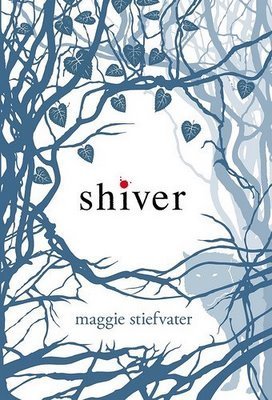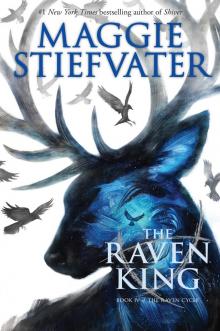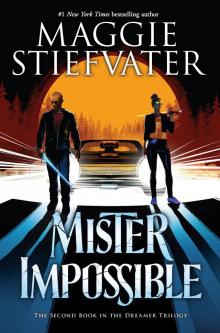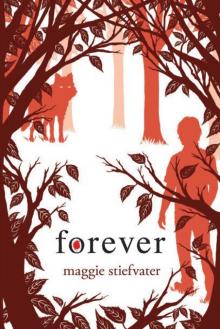- Home
- Maggie Stiefvater
Wolves of Mercy Falls 03 - Forever Page 29
Wolves of Mercy Falls 03 - Forever Read online
Page 29
I thought Rachel had abandoned me for the car, but after the first couple moments of silence, she came down the hall from the front door, holding the tabby kitten under her arm. She wordlessly put it down on the couch and came to stand behind me. She looked as if she would rather be anywhere but here. It was rather valiant, and my heart sort of swelled to see it. Everybody ought to have friends like Rachel.
“This is very shocking, Grace,” my father said, across from me. “You’ve put us through a lot.”
My mother began to cry.
I changed my mind, right then. I no longer wanted to see evidence of their anguish anymore. I didn’t want to watch my mother cry. I had spent so long hoping that they had missed me, wishing that they loved me enough that it would hurt that I was gone, but now that I saw my mother’s face, guilt and sympathy were making a solid lump in my throat. I just wanted to have had the conversation already and be back on the way home. This was too hard.
I started, “I wasn’t trying to put you —”
“We thought you were dead,” my father said. “And all this time, you were with him. Just letting us —”
“No,” I said. “I was not with him all this time!”
“We’re just relieved that you’re all right,” Mom said.
But Dad wasn’t there yet. “You could have called, Grace,” he said. “You could have just called so we knew you were alive. That was all we needed.”
I believed him. He didn’t really need me. He needed proof of me. “Last time I tried to talk to you, you told me I couldn’t see Sam until I was eighteen, and completely talked over the top of m —”
“I’m calling the police to tell them you’re here,” Dad said. He was halfway out of his seat.
“Dad,” I snapped. “First of all, they know. Second of all, you’re doing it. You’re not even listening to half of what I say.”
“I am not doing anything,” he said. He looked at Rachel. “Why did you bring Rachel?”
Rachel twitched a bit at the sound of her name. She said, “I’m the referee.”
Dad put his hands up in the air like he gave up, which is what people do when they’re not really giving up, and then he pressed them against the table like we were having a séance and the table was trying to move.
“We don’t need a referee,” Mom said. “There’s not going to be anything unpleasant.”
“Yes, there is,” Dad said. “Our daughter ran away from home. That’s a crime, Amy. An actual crime in the eyes of Minnesota law. I’m not going to pretend it didn’t happen. I’m not going to pretend that she didn’t run away to live with her boyfriend.”
I wasn’t sure what it was about that statement that made me suddenly see everything with perfect clarity. Dad was going perfectly through the motions of parenting: an autopilot setting that was completely reactionary and probably learned from television shows and weekend movies. I studied them: Mom huddled with her new kitten, which had wandered from the couch to jump on her lap, and Dad staring at me as if he didn’t recognize me. Yes, they were grown-ups, but I was, too. It was like Rachel had said about me being her older sister. My parents had raised me to be an adult as fast as they could and they couldn’t be offended when I turned into one.
I pressed my hands onto the table, too, an echo of Dad’s posture. And then I said what I’d wanted to say for a long time. “And I’m not going to pretend that I didn’t almost die in your car, Dad.”
“Oh, come on, now,” he said.
My stomach hurt with my indignation. “No, I won’t come on, now. It’s just a symptom. You forgot you had a kid in your car. And before that, I was dragged off the swing by wolves while Mom was upstairs painting. And yeah, I had my boyfriend sleeping in my bed here, but it took you weeks to realize it. Did you even notice I was sleeping here? You gave me thirty miles of free leash. Did you think I wouldn’t use it?”
Rachel frantically applied lip gloss again.
“Okay,” Mom said. The cat was crawling around her neck. She pulled it off and handed it to Rachel, which I thought was probably against referee rules. Rachel did look happier with the kitten, though. “Okay. So where does that leave us? I’m not going to fight anymore. God, Lewis. I don’t want to fight with her. I thought she was dead.”
Dad’s lips made a thin line, but he sealed his mouth shut.
I took a deep breath and steeled myself. I had to get this out right. “I’m moving out.”
“You are not,” Dad said immediately.
“That is why I’m moving out,” I replied. “You don’t get to tell me what to do all of a sudden. You can’t just wait until I start to choose my own family and my own life and my own happiness and say, no, Grace, that’s not allowed. Go back to being lonely and miserable and a grade-A student! It’s not fair. It’d be different if you were there like Rachel’s parents or Sam’s parents.”
My father made a face. “The ones who tried to kill him?”
“No, Beck,” I said. I thought about that afternoon, Beck and Sam, head to head, that silent bond so strong that it was visible to bystanders. I thought about Sam’s gestures, putting his hands behind his head, how he had gotten them from Beck. I wondered if there was anything of my parents in me, or if who I was was entirely cobbled from books and television and teachers at school. “Sam would do whatever Beck asked him to do, because Beck’s always been there for him. You know who’s always been there for me? Me. Family of one.”
“If you think you’re going to convince me,” my father said, “you’re not. And the law is on my side, so I don’t need to be convinced. You are seventeen. You don’t get to make decisions.”
Rachel made a noise that I thought was her refereeing but turned out to be just the kitten biting her hand.
I hadn’t really thought I would persuade Dad that easily. It was principle now, I could see, and Dad wouldn’t back down from that. My stomach squeezed again, nerves crawling up into my mouth. I said, my voice lower, “Here’s the deal. I’m going to do summer school to finish high school, and then I’m going to go to college. If you let me move out now, I will actually talk to you guys after I hit age eighteen. Or you can call the cops and force me to stay and I will sleep in that bed and follow all your brand-new rules, and then, when midnight rolls over on my birthday, that room will be empty and I will never come back. Don’t think that I’m joking. Look at my face. You know I’m dead serious. And don’t talk to me about the law, Dad! You hit Sam. Tell me what side of the law that’s on?”
My stomach was a disaster zone. I had to will myself not to say anything else, to shove words into the empty space.
There was complete silence at the table. My father turned his face away and looked out the window at the back deck, though there was nothing to see but blackness. Rachel pet the kitten furiously and it purred as if it would split its ribs, loud enough that it filled the room with the sound. My mother’s fingers rested on the edge of the table, her thumb and forefinger pressed against each other as she moved her hands back and forth, like she were measuring out invisible thread.
“I’m going to suggest a compromise,” she said. Dad glared at her, but she didn’t look back.
Disappointment sat in my chest, heavy. I couldn’t imagine a compromise that would come anywhere near to being acceptable.
“I’m listening,” I said, voice flat.
Dad burst out, “Amy! A compromise? You can’t be serious. We don’t need that.”
“Your way’s not working!” Mom snapped.
Dad leveled a glare at my mother, charged with so much anger and disappointment.
“I can’t believe you’re going to condone this,” he said.
“I’m not condoning. I talked to Sam, Lewis. You were wrong about him. So now it’s my turn to talk.” To me, she said, “This is what I suggest. You stay here until you turn eighteen, but we treat you like an adult. You can see Sam and you won’t have a curfew as long as you” — she paused as she came up with her conditions on the spot — “keep up wi
th your summer school and seem to be keeping up with your academic goals. Sam can’t stay here overnight, but he can stay here all day long for all I care, and we’ll try to get to know him better.”
She looked at Dad. His mouth worked, but he just shrugged. They both looked at me.
“Oh —” Mom said. “And you still talk to us after you turn eighteen. That’s part of it, too.”
I pressed my fingers against my lips, my elbows leaned on the table. I didn’t want to give up my nights with Sam, but it was a fair compromise, especially when I hadn’t seen any way to a compromise. But what if I shifted? I couldn’t move back in until I was sure that I was stable. That had to be soon. Maybe now? I didn’t know. Cole’s cure would come too late to be useful.
“How do I know you’re not going to try to change the rules on me again?” I asked, stalling. “Sam is not negotiable, for instance. I’m keeping him. Forever and ever. I should put that out there right now. He’s the one.”
Dad made another face but didn’t say anything. Mom, to my amazement, nodded a little. “Okay. I said we’d try. And not stop you from seeing him.”
“And no more punching,” Rachel put in. I shot her a look. I felt it was a bit of cheating, waiting until the conflict had mostly subsided to fulfill her referee duties.
“Right,” Mom said. “Grace, what do you think?”
I glanced around the room: From here I could see the kitchen and the breakfast area, and it made me feel weird. I had thought this would be the last time I came here. That it would be a big fight and I would slam that book shut and never see it again. The idea of coming back to this house and climbing back into my old life was simultaneously relieving and exhausting. I thought of Sam’s dread of shifting again after he’d thought he was done and understood it infinitely.
“I … I have to think about it,” I said. “I want to sleep on it.”
“Can’t you sleep on it here?” Mom asked.
Rachel shook her head. “No, because she has to take me back home, anyway. Referee says.”
I stood up, making it not an option. I didn’t understand why my stomach still burned with nerves after the worst had gone by. “I’ll think about it and come back to talk about it.”
Mom stood up then, too, so fast that the kitten started and hissed in Rachel’s arms, a tiny sound like a sneeze. Mom came around the table and hugged me again — a tight, weird-fitting hug that made me realize I couldn’t remember the last time, before this night, that she had attempted it. I wasn’t exactly sure where to hug her back, now that the time had come. She seemed all boobs and hair, so I just — squeezed in a general way.
“You will come back?” she said into my ear.
“Yes,” I said, and really meant it.
Dad stood up and gave me a draping shoulder-hug, as if possibly he knew he’d also find me all boobs and hair if he tried for a better one.
“Here’s your cat,” Rachel said, and handed my mother the kitten.
“Thank you for bringing her back,” Mom said. I couldn’t tell if she was talking about the cat or me.
Rachel shrugged and hooked arms with me. “It’s what I do.” And with that, she towed me out of the house and back into the car. My parents stood at the doorway and watched the car, oddly forlorn looking, as we backed out and headed down the road. I felt giddy and ill.
The car was quiet for one minute.
Then Rachel said, “I can’t believe they replaced you with a cat.”
I laughed, and it made my skin crawl. “I know, right? Thank you for coming. I mean, thank you. They were reasonable because you were there.”
“They were reasonable because they thought you were dead. Do you — feel okay, Grace?”
I had missed a gear and the car gasped until I shifted to the right gear. I wasn’t the greatest with a stick shift, and suddenly it felt like too much effort to focus on. My stomach clenched again then, at the same time that a tremble worked its way up my arms, and I realized that what I’d put down as nerves was something worse.
“Oh, no,” I said, nausea rolling inside me. “I have to pull over. I’m sorry, I —”
The night road was deserted. I jerked the car to the shoulder and opened the door. I promptly threw up behind the car. Rachel’s face was white in the gloom; I hadn’t realized she’d gotten out.
She flapped her hands. “What do I do? I can’t drive a stick shift!”
I was starting to shiver now, hard, involuntary tremors that clicked my teeth together. “Rach, I’m so, so sorry. You need to —” I stopped to curl against the side of the car. Oh, God, I hated this part. My bones were breaking. No, no, no.
“Need to what? Grace, you’re freaking me out. Oh, no. Oh, no!” It was suddenly dawning on Rachel what was going on.
“Call Sam,” I managed. “Tell him I’ve shifted and to come get you. Cole can — ugh. Cole can drive the other car — oh — Rachel — go — wait in the car. Don’t —”
My knees didn’t want to hold me. They were loosening, getting ready to grow into something else. I was suddenly afraid of what she would think, watching me shift. She had to wait in the car. She couldn’t watch — it would ruin everything between us. My skin felt like someone else’s. I thought I must look terrible already.
But Rachel hugged me, a huge hug around my body and her cheek leaning against my tense one. I stank of wolf and I must have looked like a monster, and she was hugging me hard enough that I could feel it over the top of the pain. She was so brave that she made a tear escape.
“Does it hurt?” Rachel whispered, letting me go.
I shook my head fiercely. I balled my hands up against my body. “I just love you and it’s making me … making me …”
“Turn into a wolf,” said Rachel. “I know.” She wiped her nose with the back of her hand. “I have that effect on people.”
I tried to say something else, but I lost my footing. The stars were brilliant above me, and I remembered yet another night: me and Sam under the stars, watching the northern lights. In my head the pink lights of the aurora borealis became the lights of the dash reflected in every broken piece of my Bronco’s smashed windshield, Sam and I behind it, saying good-bye, and then it was just me, broken into pieces, slivered like glass, made into something new.
CHAPTER SIXTY
• SAM •
It was oddly distressing to lose a night of sleep with Grace like this — out of the blue, with me far away from where she’d shifted. After dropping off Rachel, I wanted to go look for her, but Cole convinced me that it was useless; she wouldn’t come to me, and if she shifted back near her parents’ house, at least she’d know where she was. I didn’t think that I would fall asleep without her, but after Cole talked me out of driving back to where Rachel had left her, I lay in my bed and stared up at my paper birds and Christmas lights and pretended I was just waiting for Grace to come to bed. The long day stretched out behind me, and when I couldn’t hold all of the things that had happened in my mind at once, sleep found me.
I dreamed I was walking around the house, going from room to room. Each room was empty, but it was a full, breathing emptiness, like I might turn and see someone behind me at any moment. The house itself felt inhabited — not recently, but currently — as if the residents had merely gone outside to investigate the weather and would shortly return. The bedrooms, certainly, bore signs of life: On each bed was a suitcase or a backpack filled with clothing, shoes placed carefully beside it, personal effects laid out, waiting to go. Ulrik’s bed had his laptop and his electric razor. Paul’s had a pile of guitar picks and some burnt DVDs I had never heard of. Even the room with the bunk beds had supplies on their beds: Derek’s earbuds tangled on top of his camera, and Melissa’s sketchbook beside her shoes. Beck’s bed was empty.
I went from room to room, turning off lights in each room as I did. Good-bye to Beck’s room, never occupied. Good-bye to Ulrik’s room, where we’d watched horror movies on his laptop. I went downstairs without going to my room. G
ood-bye to the living room, where I had once sat with Grace on the sofa, nearly a wolf, where Isabel had helped stop Cole’s seizure. I turned the light off. Good-bye to the yellow room that Cole lived in and Jack died in. Lights off in the bathroom I had avoided for a decade. Good-bye to the kitchen, with its photographs of us pinned and taped to every cabinet, one thousand smiles, every one of them genuine. I turned off the light and headed to the basement.
And here, in Beck’s library, surrounded by books, were Beck’s things that had been absent from his room, his suitcase and his shoes, sitting on the ottoman of his reading chair. His tie was folded neatly by them and beside them both was a CD with tangled branches on the cover. The title was scrawled in the only available white space: Still Waking Up.
All around me was Beck, living inside all of these books that he had read. He inhabited every page. He was every hero, every villain, every victim and every aggressor. He was the beginning and end of everything.
Die letzte aller Türen
Doch nie hat man
an alle schon geklopft
(The last of all doors
But one has never
knocked on all the others)
This was the last good-bye. I turned off the light.
There was only one place left. I slowly climbed the stairs to the ground floor and then to the second floor. Walked down the hall to my room. Inside, my paper birds trembled on their strings, caught in the premonition of an earthquake. I could see each memory that the birds contained, images playing across their wings like a television screen, all of them singing bright songs that I had sung before. They were beautiful and terrified, jerking to be free.
“Bad news, Ringo,” said Cole. “We’re all going to die.”
I woke up to the sound of the telephone.
Adrenaline shot through my half-asleep body at the sudden noise, and the first clear thought I had, inexplicably, was Oh, no, not here. Half a moment later I realized the noise was just the telephone, and I couldn’t think why I had thought that. I picked up the receiver.

 Lament: The Faerie Queens Deception
Lament: The Faerie Queens Deception Sinner
Sinner The Dream Thieves
The Dream Thieves All the Crooked Saints
All the Crooked Saints Shiver
Shiver Forever
Forever The Raven King
The Raven King Opal
Opal Linger
Linger The Raven Boys
The Raven Boys The Scorpio Races
The Scorpio Races Hunted
Hunted Ballad: A Gathering of Faerie
Ballad: A Gathering of Faerie Call Down the Hawk
Call Down the Hawk Mister Impossible
Mister Impossible Wolves of Mercy Falls 03 - Forever
Wolves of Mercy Falls 03 - Forever Lament
Lament![Maggie Stiefvater - [Wolves of Mercy Falls 02] Read online](http://i1.bookreadfree.com/i1/04/04/maggie_stiefvater_-_wolves_of_mercy_falls_02_preview.jpg) Maggie Stiefvater - [Wolves of Mercy Falls 02]
Maggie Stiefvater - [Wolves of Mercy Falls 02] Lament: The Faerie Queen's Deception
Lament: The Faerie Queen's Deception Pip Bartlett's Guide to Magical Creatures
Pip Bartlett's Guide to Magical Creatures Ballad
Ballad